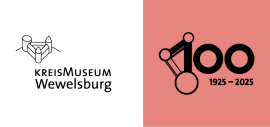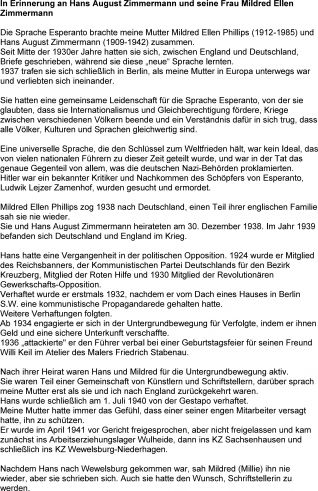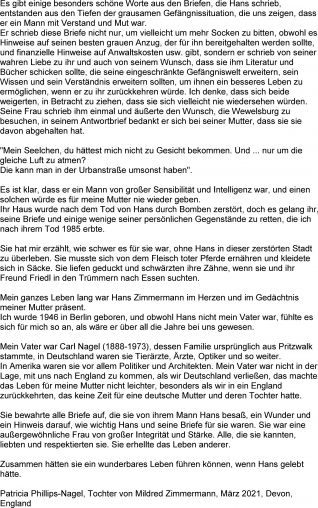Remembering Hans August Zimmermann and his wife Mildred Ellen Zimmermann
It was Esperanto that brought my mother Mildred Ellen Phillips (1912–1985) and Hans August Zimmermann (1909–1942) together.
They had been corresponding, between England and Germany since the mid 1930s while they were practising the ‘new’ language.
They finally met in Berlin in 1937 when my mother was travelling in Europe. They fell in love.
They had a shared passion for the Esperanto language which they believed promoted internationalism and equality, brought an end to wars between different peoples and which held within it an understanding that all peoples, cultures and languages are of equal value.
A universal tongue holding the key to world peace was not an ideal generally shared by many national leaders at that time and was in fact the exact opposite of everything the German Nazi authorities proclaimed.
Hitler was a known critic and descendents of the creator of Esperanto, Ludwik Lejzer Zamenhof were sought out and destroyed.
Mildred Ellen Phillips moved to Germany in 1938, she never again saw any of her English Family.
She and Hans August Zimmermann were married on the 30th December 1938. In 1939 Germany and England were at war.
Hans had a history of political opposition. He became a member of the Reichsbanner in 1924, the Kommunistische Partei Deutschlands in charge of the district of Kreuzberg, a member of the Rote Hilfe and a member of the Revolutionäre Gewerkschafts-Opposition in 1930.
He was first arrested in 1932 after he gave a Communist Propaganda speech from the roof of a House in Berlin S.W. Other arrests followed.
From 1934 he was actively engaged in “underground work” for those who were being persecuted, providing money and safe lodging for them.
In 1936 he ‘attacked’ the Fuehrer verbally at a birthday party for his friend Willi Keil, in the studio of painter Friedrich Stabenau.
After their marriage Hans and Mildred were active for the ‘Underground’. They were part of a community of artists and writers and my mother spoke about this when she and I returned to England.
Hans was finally arrested by the Gestapo on the 1st July 1940.
My mother always felt one of his close associates had failed to protect him.
He was acquitted by the Court of Justice in April 1941 but not released and was sent first to Arbeitserziehungslager Wulheide, then to KZ Sachsenhausen and finally to KZ Wewelsburg-Niederhagen.
Mildred never saw Hans after he went to Wewelsburg but they wrote to each other. Mildred (Millie) also had wished to become a writer.
There are some especially beautiful words from Hans in his letters from the depths of the most cruel prison situations, showing us that he was a man of intellect and
courage.
He was not writing letters only to ask for perhaps more socks, although there are references to his best grey suit to be kept ready for him and financial references to lawyers’ fees etc. but he wrote of his real love for her and also his wish for her to send literature and books that would widen his restricted prison world, extend his knowledge and understanding to allow them a better life when he returned to her.
I think that they both refused to consider they might not ever meet again.
His wife wrote to him expressing a wish to visit Wewelsburg and in his letter of reply he is grateful to his mother for dissuading her.
“Mein Seelchen, you would not have set eyes on me.
And ... just to breathe the same air?
You can have that for free on Urbanstrasse”.
It is clear that he was a man of great sensitivity and intelligence and there would never be such a one ever again for my mother. Mildred was bombed out of their home after Hans had died but she managed to save his letters and a very few of his possessions which I inherited after her death in 1985.She has told me how hard it was for her to survive without Hans in that destroyed city, cutting up dead horses for food and dressing in sacks bending their backs and blackening their teeth when she and her dear friend Friedl went out from the ruins to find food.
All my life, Hans Zimmermann was there as a strong presence in my mother’s heart and memory.
I was born in Berlin in 1946 so although Hans was not my father, it felt to me like he was there with us over all the years.
My father was Carl Nagel (1888–1973) whose family originally came from Pritzwalk, they were Veterinarians, Doctors, Opticians and so on in Germany and notably Politicians and Architects in America. My father was not able to come to England with us when we left Germany so my mother did not have an easy life especially when we returned to an England that had no time for a German mother and daughter.
She preserved all the letters that she held from her husband Hans, quite a miracle and an indication of how important Hans and his letters were to her.
She was an exceptional woman of great integrity and strength.
All who knew her had respect and love for her. She lit up other’s lives.
Together, they would have made a wonderful life, if Hans had lived.
Patricia Phillips-Nagel, Daughter of Mildred Zimmermann, March 2021, Devon, England
Brief von Hans für Mildred Zimmermann
23. August 1942
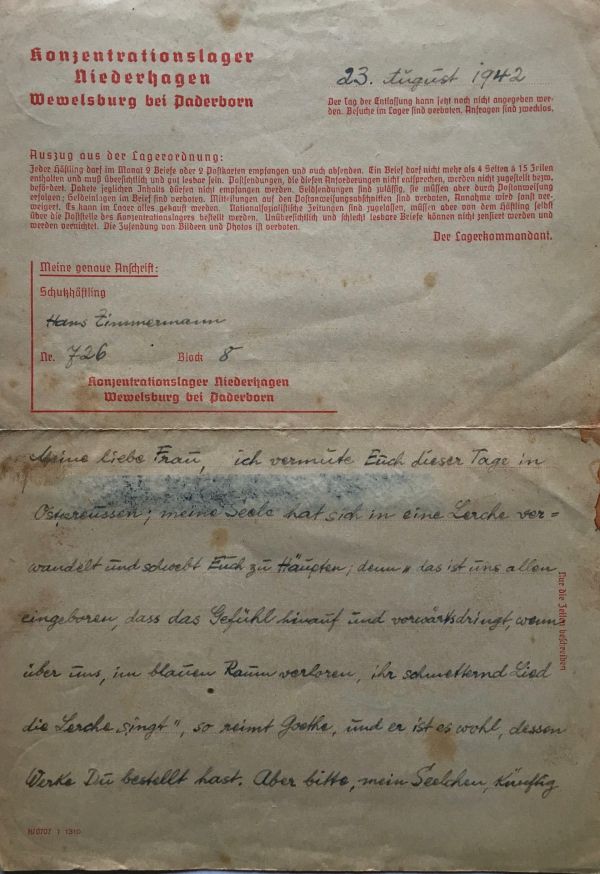
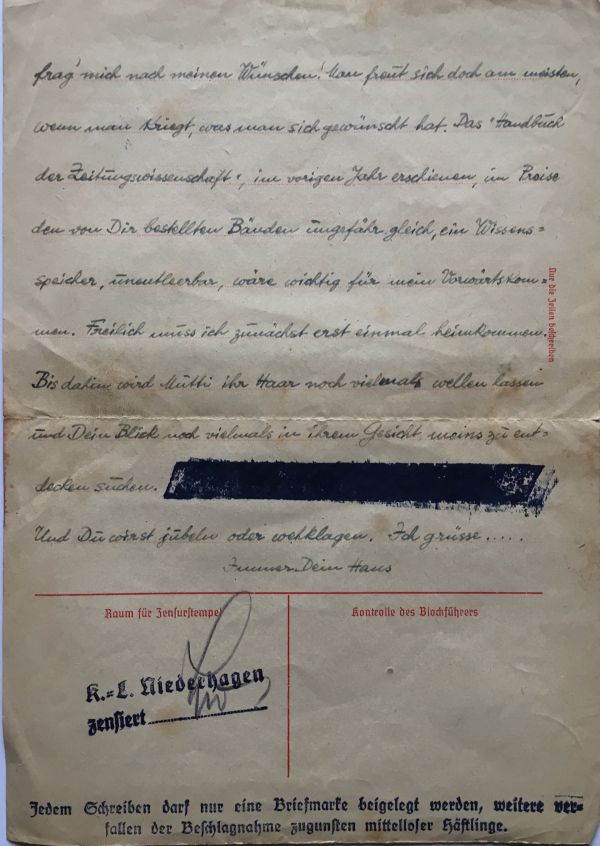
[Vorderseite]
Mein Liebe Frau, ich vermute Euch dieser Tage in Ostpreussen;
Meine Seele hat sich in eine Lerche verwandelt
und schwebt Euch zu Häupten;
denn das ist uns allen eingeboren,
dass das Gefühl hinauf und vorwärts dringt,
wenn über uns, im blauen Räum verloren,
ihr schmetternd Lied die Lerche singt“,
So reimt Goethe, und er ist es wohl, dessen Werke Du bestellt hast.
Aber bitte, mein Seelchen, künftig
[Rückseite]
frag’ mich nach meinen Wünschen! Man freut sich doch am meisten, wenn man kriegt, was man sich gewünscht hat.
Das “Handbuch der Zeitungswissenschaft”, im vorigen Jahr erschienen, im Preise den von Dir bestellen Bänden ungefähr gleich, ein Wissensspeicher, unentleerbar, wäre wichtig für mein Vorwärtskommen.
Freilich muss ich zunächst erst einmal heimkommen.
Bis daher wird Mutti ihr Haar noch vielmals wellen lassen und Dein Blick noch vielmals in ihrem Gesicht, meins zu entdecken suchen.
(zensiert) Und Du wirst jubeln oder wehklagen.
Ich grüsse …….
Immer Dein Hans
WE REMEMBER
TO ENSURE THAT
WE DO NOT FORGET.
A PERSONAL MEMORY ON
HANS ZIMMERMANN FOR 2021 – WEWELSBURG
The past has sown within it, the seeds that have shaped our present.
The way we are today. How the world and we, as individuals, live and grow
and so that we can understand where we are today.
We remember so that we can be thankful to all those, especially here in Wewelsburg, who bore the costs to defend our freedoms and our peace.
We remember the promises we have made to them, not to repeat the same mistakes.
Remembrance unites all peoples.
Each of us is free, to remember, in our own way.
Reflecting on our individual and very personal Memories.
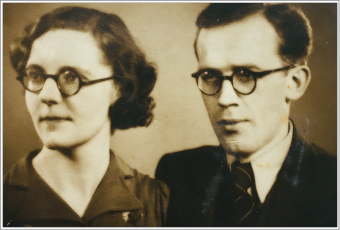
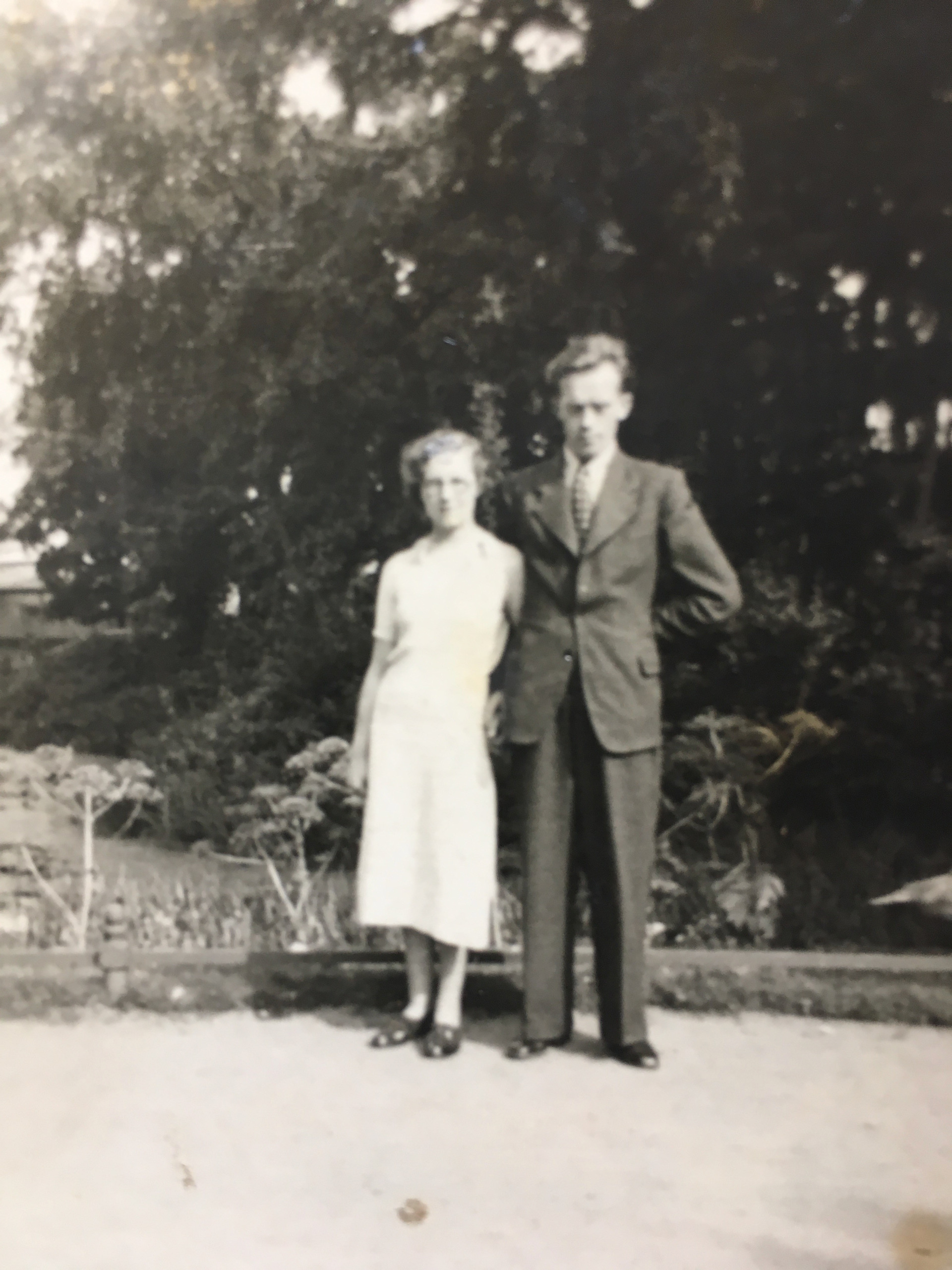
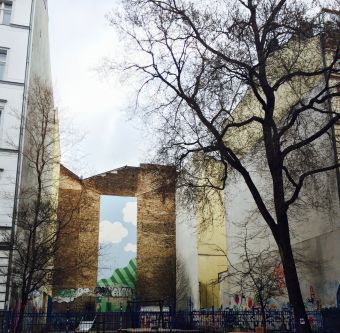
Hans and Mildred Zimmermann lived here from 1938. It is now a space holding only memories.
This is where the letters that Hans wrote from Wewelsburg to Mildred were sent.
It was bombed after Hans died but she kept his letters safe, all her life, through much turmoil and distress. Hans Zimmermann was the love of her life. I was born in Berlin in 1946 and inherited his letters when she died in 1985.
She returned to England in 1948.

Anschrift
Kreismuseum Wewelsburg
Burgwall 19
33142 Büren-Wewelsburg
Deutschland
Kontakt
Tel. 02955 7622-0
Fax 02955 7622-22
nfwwlsbrgd
Kontaktformular
